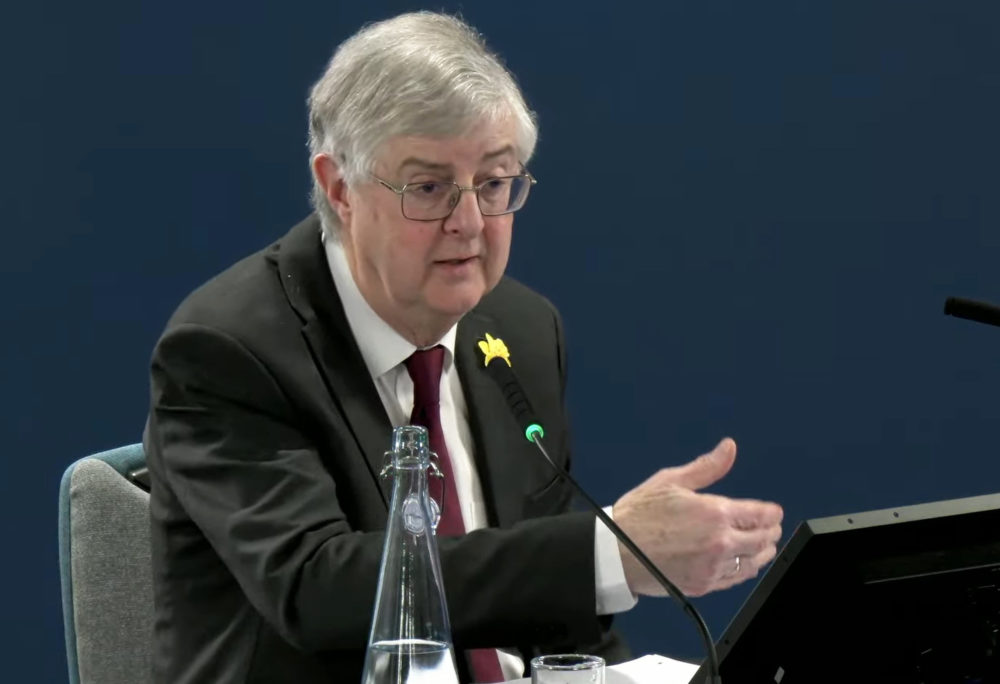Boris Johnson like an ‘absent football manager’ during pandemic – Mark Drakeford

Boris Johnson was like the “absent manager” of a football team during the pandemic, a public inquiry has heard.
Mark Drakeford, the outgoing Labour First Minister for Wales, heavily criticised the former prime minister, during his appearance at the UK Covid-19 Inquiry on Wednesday.
Mr Drakeford – who is due to leave his post next week – said the PM was “not taking it seriously” during the early pandemic and accused him of being deliberately unclear when new rules only applied to England.
In a written statement to the inquiry, Mr Drakeford described Michael Gove – the minister for the Cabinet Office during the early part of the pandemic and point of contact between the two governments – as “a centre forward without a team lined up behind him, and where the manager was largely absent”.
Addressing the inquiry, Mr Drakeford clarified he was talking about Mr Johnson.
He said: “The absent manager was the prime minister because he was never in these meetings or at the table.”
Influence
While he praised Mr Gove, he described him as having “influence rather than the determinative impact” that Mr Johnson would have had in the meetings.
Earlier hearings heard Mr Johnson had decided not to meet heads of the devolved nations to avoid giving the impression that the UK was federalised or like a “mini-EU”.
Mr Drakeford said he had written to Mr Johnson “regularly” asking for a “predictable series of meetings between the heads of the four nations” and called the decision not to meet with the devolved nations an “extraordinary decision”.
The First Minister claimed that mass gatherings, like the Cheltenham Festival, had only been kept open during the early stages of the pandemic because Dominic Cummings, the former PM’s adviser, had refused to stop them.
Cobra meetings
He said he had made the argument in Cobra meetings – major briefings between the UK government and devolved nations – on March 12, weeks before the first lockdown.
He said: “In this discussion, the Prime Minister did go round the room, he took views from anybody who wanted to contribute, and in that discussion, I was arguing for a four-nation agreement that mass gatherings would not go ahead.”
He added: “The reason I have such a vivid memory of it is that having gone round the table the prime minister summed up against that course of action by saying ‘Dom says no,’ that was his final contribution.
“I did not know who Dom was at this point.”
The Welsh government was criticised for initially allowing a Six Nations rugby union match to go ahead on March 13.
The game was ultimately cancelled the day before kick-off.
He also claimed that Mr Johnson had been “deliberate” in making it unclear that new Covid rules only applied to England, despite pleas from the heads of the devolved governments.
Mr Drakeford said: “(We said) he must make it clear that what he is about to say does not apply to Scotland or Wales or Northern Ireland and he gives assurance in the COBR meeting that he will do his very best to make sure that he does that.
“He then heads to the cameras, and he provides a script in which the only time he refers to Scotland, Wales and Northern Ireland is when he says early in the press conference ‘as the Prime Minister of Scotland, Wales and Northern Ireland’.
“It is a very clear indication to people that what he’s about to say applied to the whole of the United Kingdom, and he never once says that is not the case.”
Mr Drakeford described this as a “bleak moment” and “deliberate”.
Matt Hancock
The inquiry also heard that Matt Hancock, the then-UK health secretary, incorrectly stated that public health was not devolved in an “extraordinary exchange of messages” with Mr Gove.
In his evidence to the inquiry, Mr Drakeford said there was a “lack of clarity” over the legislative basis for powers that would be needed to deal with the pandemic, which continued through March 2020.
“My belief right up until March 20 is that the essential decisions would remain in the hands of the UK Government and that devolved governments would be implementers of those decisions,” he told the hearing.
“Even on March 20 there is further confusion over the next couple of days as to where the ability to exercise public health powers lie.
“And there is an extraordinary exchange of messages between Mr Gove and Mr Hancock on May 30, in which Mr Hancock says ‘I’ve seen the submission, it’s disgraceful that lawyers don’t understand where these powers lie because public health is not devolved’.”
Mr Drakeford continued: “So here is the secretary of state for health in England getting the most basic thing entirely wrong.”
He told the hearing it was “pretty alarming” that the legal basis for which “profoundly consequential decisions were being made” was still being resolved on March 20.
The inquiry continues.
Support our Nation today
For the price of a cup of coffee a month you can help us create an independent, not-for-profit, national news service for the people of Wales, by the people of Wales.






Just because they say ‘it was clinical’ doesn’t mean the ‘striker’ knew anything about medicine…might I remind you that this is still a serious subject Mr D…
…’dancing, dancing with Mr D’, ‘Goats Head Soup’ 73
That’s what it feels like, all a bit glib…
It’s always someone else’s fault when things go wrong in Wales. Nothing is ever this tinpot’s fault !!!
The man that can’t use a phone is now comparing the covid pandemic with sport, really. thank god he’s going.